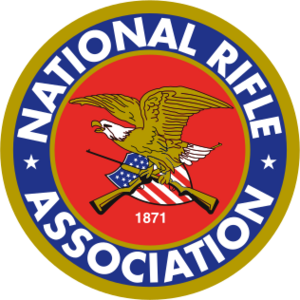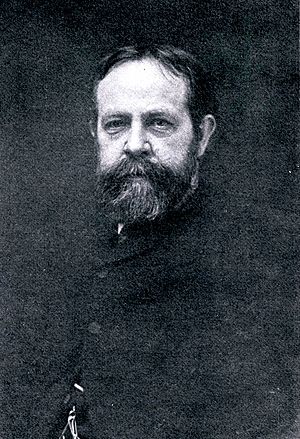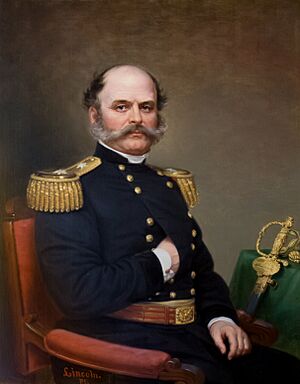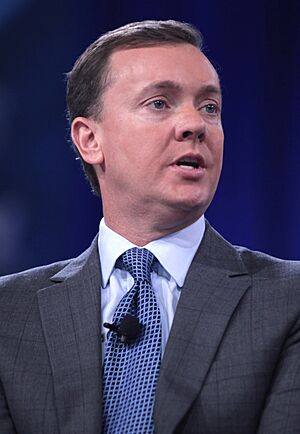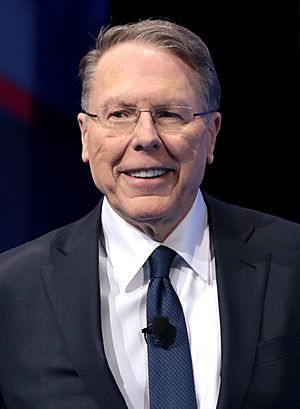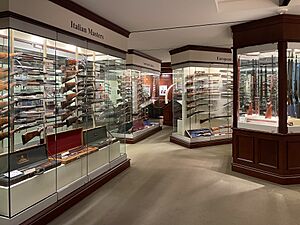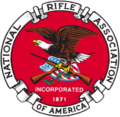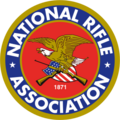National Rifle Association facts for kids
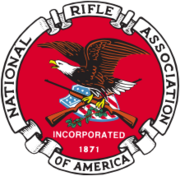 |
|
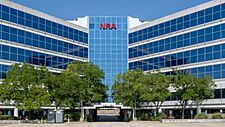
Headquarters in Fair Oaks, Virginia
|
|
| Founded | November 17, 1871 |
|---|---|
| Founder |
|
| Founded at | New York City |
| Type | 501(c)(4) |
| Focus |
|
| Location |
|
|
Area served
|
United States |
| Services |
|
| Method |
|
|
Members
|
Approximately 5.5 million (self-reported) |
|
Key people
|
|
| Subsidiaries |
|
|
Revenue (2018)
|
$412,233,508 |
| Expenses (2018) | $423,034,158 |
The National Rifle Association of America (NRA) is a group in the United States that supports gun rights. It was started in 1871 to help people become better at shooting rifles. Today, the NRA is a well-known group that works to protect gun rights. It also teaches about firearm safety and how to use guns well. The organization publishes magazines and holds shooting competitions. The NRA has said it has about 5.5 million members.
The NRA is one of the most powerful groups in U.S. politics. Its lobbying part, called the NRA Institute for Legislative Action (NRA-ILA), works to influence laws. It also manages a group that helps politicians, called the Political Victory Fund (PVF). Over time, the NRA has helped shape laws, been part of lawsuits, and supported or opposed politicians. For example, the NRA-ILA helped pass the Firearm Owners Protection Act. This law made some gun rules less strict. They also influenced the Dickey Amendment, which stops a government health group from using money to push for gun control.
Since the late 1970s, the NRA has faced more criticism. This happened after some big changes in the NRA's goals. These changes, which happened after a meeting in 1977, moved the group away from just focusing on hunting and shooting skills. Instead, it began to focus more on defending the right to bear arms. The NRA has been criticized after major shootings, like the Sandy Hook Elementary School shooting and the Parkland High School shooting. After these events, the NRA suggested putting armed security guards in schools.
Contents
History of the NRA
How the NRA Started
The National Rifle Association of America was officially started in New York on November 17, 1871. It was founded by William Conant Church, who edited a newspaper called Army and Navy Journal, and Captain George Wood Wingate. A week later, the group chose its first leaders. Ambrose Burnside, a general from the Civil War, became the first president. He had also worked as a gunsmith. When Burnside left in 1872, Church became president.
During the Civil War, soldiers often had trouble hitting their targets. General Burnside noticed that many soldiers who were good at drills didn't know how to aim their rifles. He said that out of ten soldiers, only one could hit the side of a barn. This showed a need for better training.
To help with training, Wingate sent people to other countries to learn about their shooting programs. With Wingate's plans, New York State helped build a modern shooting range called Creedmoor on Long Island. This range opened in 1873 for long-range shooting contests.
The NRA became more well-known after an American team won a shooting match against Ireland in 1874. This match showed that new types of rifles, called breech-loading weapons, were good for military training. In 1875, the NRA started an international rifle match as part of the 1876 celebration of the nation's founding. The United States won this match, and the competition, called the Palma Match, still happens every four years.
Early Rifle Clubs and Support
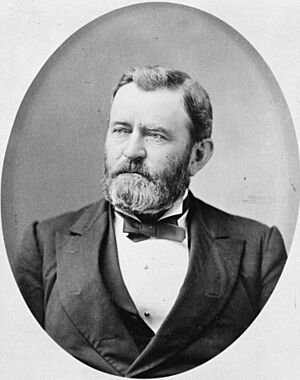
The NRA helped start rifle clubs in other states. Many state National Guard groups asked the NRA for advice to improve their members' shooting skills. Former U.S. President Ulysses S. Grant and General Philip H. Sheridan both served as presidents of the NRA.
In 1901, the U.S. Congress created a board to help promote rifle practice. This board included people from the NRA and the military. They also approved annual shooting competitions for both military and civilian shooters. In 1907, the NRA moved its main office to Washington, D.C., to be closer to where laws are made.
Changes in Focus (1934–2000s)
After the first major federal gun control law, the National Firearms Act (NFA), was passed in 1934, the NRA created a special division to keep its members informed about new laws. At first, the NRA supported some gun control measures, like those that made it harder for criminals to get guns.
Before the 1970s, the NRA focused mainly on sports, hunting, and target shooting. It was not strongly tied to any political party. However, in the 1970s, the NRA started to become more involved in politics. It began to work closely with the Republican Party.
In 1975, the NRA created its lobbying arm, the Institute for Legislative Action (NRA-ILA). This group works to influence laws. The next year, its political action committee (PAC), the Political Victory Fund, was formed to help with elections. A big change happened at the NRA's meeting in 1977, often called "The Cincinnati Revolution." At this meeting, members who wanted the NRA to focus more on defending gun rights took over leadership. They believed the NRA should not compromise on gun control.
The NRA-ILA worked to weaken some gun control laws. For example, they helped pass the Firearm Owners Protection Act in 1986. In the 1990s, the NRA opposed the Federal Assault Weapons Ban, which was a law that banned certain types of firearms for 10 years. This ban ended in 2004.
Recent Events (2018–Present)
In 2019, the NRA had a disagreement with its public relations company, Ackerman McQueen. The NRA sued the company, saying it refused to show how it was spending money. The NRA also had concerns about NRATV, an online channel run by Ackerman, which was discussing political topics not directly related to guns. In June 2019, the NRA ended its relationship with Ackerman McQueen and closed NRATV.
In August 2020, the New York Attorney General filed a lawsuit against the NRA. The lawsuit claimed that some of the NRA's leaders had misused money. In January 2021, the NRA announced it had filed for bankruptcy. It also said it planned to move its official base to Texas. However, in May 2021, a judge dismissed the bankruptcy case. The judge said the NRA did not file in good faith and was trying to avoid legal issues in New York.
In March 2022, a New York court ruled that the NRA could not be completely shut down. The judge said that dissolving the NRA would harm the free speech rights of its members. The court allowed the lawsuit against the NRA's leaders to continue. In February 2024, a jury in Manhattan found some NRA leaders guilty of financial misconduct. The former CEO, Wayne LaPierre, was found to have caused the NRA to lose $5.4 million.
Lobbying and Political Work
When the NRA was founded in 1871, its main goal was to "promote and encourage rifle shooting." Today, the NRA's website says it is "America's longest-standing civil rights organization."
The NRA started its first lobbying efforts in 1872. They asked the New York State government for money to buy land for a shooting range. The law to provide this money was passed within three months.
In 1934, the NRA created a special division to handle legislative affairs. This group spoke to Congress about the first major federal gun control law, the National Firearms Act.
The Institute for Legislative Action (NRA-ILA) was created in 1975. This is the part of the NRA that focuses on politics and lobbying. The NRA started to see its members as a way to influence politics. Its political action committee (PAC), the Political Victory Fund, was set up in 1976. This PAC has become one of the biggest spenders in elections for Congress.
A survey in 1999 found that lawmakers thought the NRA was the most powerful lobbying group. Chris W. Cox was the NRA's main lobbyist and political planner from 2002 to 2019. In 2012, many members of Congress had received money from the NRA's PAC. This money often shows how much a politician agrees with the NRA's views.
The NRA has been very influential in shaping gun control laws in America. It can influence how lawmakers vote because it has money and can get its many members to take action. The NRA has not lost a major fight over gun control laws at the federal level since 1994. It has also worked to reduce gun regulations at the state and local levels.
NRA's Role in Elections
The NRA Political Victory Fund (PVF) was created in 1976. Its purpose is to support politicians who favor gun rights and oppose those who want more gun control. The NRA gives grades to politicians based on their views on gun rights. An "A+" means a politician has a great record on gun issues and actively supports the Second Amendment. An "F" means they are seen as an "enemy of gun owners' rights."
The NRA supported a presidential candidate for the first time in 1980, backing Ronald Reagan. They also endorse candidates even if both have good ratings, like in the 2006 Pennsylvania Senate elections.
In the 1994 elections, Republicans worked with the NRA to encourage voters who cared about gun control. In 1993, a law called the Brady Bill was signed. This law created background checks for gun purchases. Another law in 1994 banned the sale of assault weapons for 10 years. The NRA spent a lot of money on campaigns in 1994, helping many politicians who supported gun rights get elected.
In 2016, the NRA supported Donald Trump for president. They spent more than $30 million to support him, which was more than any other independent group in that election. This was three times what they spent in the 2012 election.
Russian Influence Allegations
Some investigations looked into whether Russian individuals tried to influence U.S. politics through the NRA. Russian politician Aleksandr Torshin, an NRA member, was suspected by some of possibly sending money through the NRA to help Trump's 2016 campaign. In 2018, a Russian woman named Maria Butina was arrested and charged with acting as an unregistered agent for Russia. She was accused of trying to influence U.S. politics through groups like the NRA.
The NRA stated in 2018 that it had received a small amount of money from Russian individuals for membership dues and magazine subscriptions. However, the FBI and special counsel investigations did not find any evidence of Russian money being illegally funneled through the NRA for elections. The Federal Election Commission also dismissed these claims.
NRA's Influence on Legislation
| Bill/Law | Year | Supported | Opposed |
|---|---|---|---|
| National Firearms Act | 1934 | ||
| Federal Firearms Act | 1938 | ||
| Gun Control Act | 1968 | ||
| Federal Assault Weapons Ban | 1994 | ||
| Protection of Lawful Commerce in Arms Act | 2005 | ||
| Disaster Recovery Personal Protection Act | 2006 | ||
| Assault Weapons Ban | 2013 |
The NRA first opposed the 1934 National Firearms Act, but then supported it after some changes were made. This law regulated certain types of firearms, like machine guns. The NRA also supported the 1938 Federal Firearms Act, which required gun manufacturers and dealers to have licenses.
The NRA supported some parts of the Gun Control Act of 1968. This law regulated the gun industry and gun owners, especially focusing on selling guns across state lines. The NRA supported parts of the law that stopped guns from being sold to convicted criminals or people with mental illness.
In 2004, the NRA opposed renewing the Federal Assault Weapons Ban of 1994, and the ban ended on September 13, 2004. In 2005, the NRA supported the Protection of Lawful Commerce in Arms Act. This law helps protect gun makers and dealers from being sued if crimes are committed with their products.
Lawsuits and Legal Actions
The NRA has been involved in many lawsuits to protect gun rights. In 2005, the NRA sued San Francisco over a law that banned gun ownership and sales. The court agreed with the NRA, saying the city went too far. San Francisco had to pay the NRA for legal costs.
In 2008, the NRA filed a legal document called an "amicus brief" in a major Supreme Court case, District of Columbia v. Heller. The Supreme Court ruled that individuals have a right to own guns for self-defense, not just for military service. Many experts believe the NRA helped change how people understood the Second Amendment, which led to this ruling.
In 2010, the NRA sued the city of Chicago in the case McDonald v. Chicago. The Supreme Court ruled that the right to bear arms also applies to state and local governments.
The NRA has also sued cities and states over gun control laws. For example, in 2013, the NRA joined a lawsuit against New York's gun control law, the NY SAFE Act. In 2014, the NRA sued cities in Pennsylvania, like Philadelphia and Pittsburgh, over their local gun regulations.
In September 2019, the city of San Francisco passed a resolution calling the NRA a "domestic terrorist organization." The NRA sued San Francisco, saying the city was violating its free speech rights. However, the NRA later dropped the lawsuit after San Francisco officials clarified that their business policies had not changed.
In November 2023, the U.S. Supreme Court agreed to hear a case about whether a New York state official violated the NRA's free speech rights by telling financial institutions not to do business with the NRA. In May 2024, the Supreme Court sent the case back to a lower court for further review.
Programs and Activities
The National Rifle Association owns the National Firearms Museum in Fairfax County, Virginia. This museum has exhibits about the history of firearms in America. In 2013, the NRA National Sporting Arms Museum opened in Springfield, Missouri, displaying nearly 1,000 firearms. The NRA also publishes several magazines, such as American Rifleman.
The NRA offers many programs about firearm safety for children and adults. One program for school-age children is called "Eddie Eagle." The organization also trains and certifies firearm instructors.
The NRA supports marksmanship training and hosts the National Rifle and Pistol Matches at Camp Perry. These events are sometimes called "America's world series of competitive shooting." The NRA also works with groups like the Boy Scouts of America and 4-H to support youth shooting programs.
The NRA holds annual meetings. The 2018 meeting in Dallas, Texas, was the largest in NRA history, with over 80,000 people attending.
How the NRA is Organized
Leadership and Spokespersons
From 1991 to 2024, Wayne LaPierre was the NRA's executive vice president and chief executive officer. Other important leaders have included Oliver North, who was president from 2018 to 2019, and Carolyn D. Meadows, who became president in 2019. Bill Bachenberg is the current president.
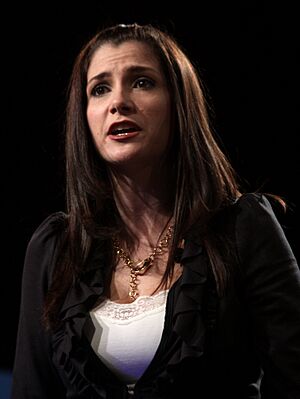
In 2017, political commentator Dana Loesch became the NRA's national spokesperson. Actor Chuck Norris serves as the honorary chairman for the NRA's voter registration campaign.
Board of Directors
The NRA is led by a board of 76 directors. These directors choose a president and other officers. In 2015, most of the board members were white and male. Only a small percentage of NRA members vote for the board.
Membership Details
The NRA reported having 5.5 million members in 2018, which was a record high. Membership dues also increased significantly that year. A 2017 study found that about 19% of gun owners in the U.S. consider themselves NRA members. The NRA says that some non-members might claim to be members in surveys to show their support.
Well-Known Members
Nine U.S. presidents have been NRA members, including Ulysses S. Grant, Theodore Roosevelt, John F. Kennedy, Ronald Reagan, and Donald Trump. Other notable members have included journalist Hunter S. Thompson and actor Charlton Heston.
Related Organizations
The NRA is made up of several connected groups. These include the NRA Institute for Legislative Action (NRA-ILA), which handles lobbying, and the NRA Civil Rights Defense Fund, which provides legal help for cases involving gun rights.
NRA Foundation
The NRA Foundation is a non-profit organization that raises money for outdoor groups and programs like ROTC, 4-H, and Boy Scouts. In 2010, the Foundation gave out $21.2 million for gun-related training and education. Most of this money went to the NRA itself, and the rest went to community programs.
Friends of NRA is a program that raises money for the NRA Foundation. Since 1992, this program has raised over $600 million.
Political Victory Fund (NRA-PVF)
The Political Victory Fund (NRA-PVF) is a political action committee (PAC) that supports politicians who are friendly to the NRA. It was created in 1976. The NRA-PVF rates political candidates based on their views on gun rights. In the 2008 elections, the PVF spent millions of dollars on campaigns.
NRA's Finances
| Name | Year | Income in Millions | Expenses in Millions |
|---|---|---|---|
| National Rifle Association (NRA) | 2011 | 218.9 | 231.0 |
| NRA Institute for Legislative Action | n/a | n/a | n/a |
| NRA Civil Defense Fund | 2012 | 1.6 | 1.0 |
| NRA Civil Defense Fund | 2013 | 1.3 | 0.9 |
| NRA Foundation | 2012 | 43.0 | 29.1 |
| NRA Foundation | 2013 | 41.3 | 31.4 |
| NRA Freedom Action Foundation | 2012 | 2.1 | 2.3 |
| NRA Freedom Action Foundation | 2013 | 0.5 | 0.1 |
| NRA Political Victory Fund | 2012 | 14.4 | 16.1 |
| NRA Political Victory Fund | 2014 | 21.9 | 20.7 |
| NRA Special Contribution Fund | 2012 | 3.3 | 3.1 |
| NRA Special Contribution Fund | 2013 | 4.3 | 3.6 |
In 2010, the NRA reported earning $227.8 million and spending $243.5 million. Less than half of the NRA's money comes from membership dues. Most of its income comes from donations, grants, and advertising.
Many companies, especially those that make firearms, donate to the NRA. From 2005 to 2011, the NRA received at least $14.8 million from over 50 gun-related companies. Some companies, like Sturm, Ruger & Company, have programs where they donate money to the NRA for each gun they sell.
Lawsuits About Finances
In 2018, the NRA claimed in a court document that it lost tens of millions of dollars because of actions by the Governor of New York and the state's financial regulator. The NRA said that these actions violated its First Amendment rights. The American Civil Liberties Union (ACLU) supported the NRA's case, saying that the government might have abused its power to target a group it didn't like.
In August 2020, the New York Attorney General sued the NRA and four of its leaders. The lawsuit claimed that the NRA misused funds and did not follow laws. It said that money was used for personal expenses for leaders instead of the group's charitable goals, causing a loss of $64 million over three years. In February 2024, a jury found NRA leaders guilty of financial misconduct.
Images for kids
See also
 In Spanish: Asociación Nacional del Rifle para niños
In Spanish: Asociación Nacional del Rifle para niños
 | May Edward Chinn |
 | Rebecca Cole |
 | Alexa Canady |
 | Dorothy Lavinia Brown |


